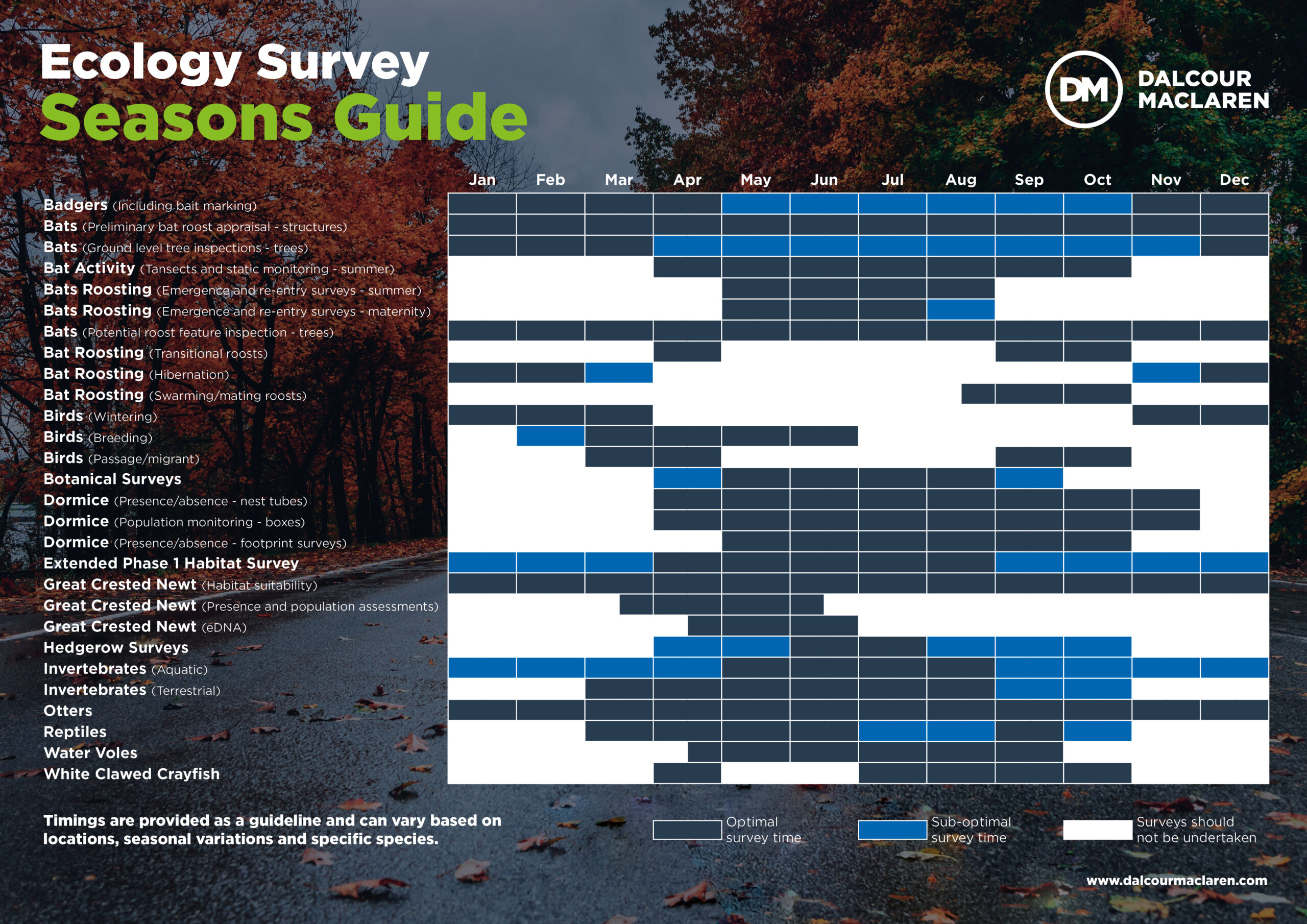With spring on its way, checking our ecology survey season calendar for your schemes is worth prompting.
We always advise that ecological surveys be carried out as early as possible on a project so that the findings can inform plans during the design stage. It’s typically easier to resolve any issues if you understand the ecological value of your site early on, and you won’t be faced with any unwelcome surprises further down the line.
When should ecology surveys be undertaken?
Ecology surveys have a shelf life of around 18 months – 2 years. After that time, they will need to be updated or repeated. If you have a long-term, more strategic project, this might be something to factor in.
It’s also important to remember that we can only carry out most protected species surveys during certain months of the year. For example, we can only undertake great-crested-newt surveys from mid-March to mid-June. If you miss that window, you will need to wait until the following spring, which could hamper the delivery of a project and mean a costly and unnecessary delay to your project, especially if it’s supporting EIA, planning, consents or licenses. Our survey seasons calendar can help you plan ahead.
Which surveys should you look at doing first?
Preliminary Ecological Surveys (PEA) and preliminary roost assessments are usually a starting point in an ecology assessment and can be carried out any time of year. The month of march is a good time for any Phase 2 protected species surveys. If they are required can be booked at the start of the survey season. Phase 2 surveys usually require multiple site visits, so they should be scheduled early in the season to allow plenty of time.
On schemes where vegetation clearance is required, or works are likely to impact habitats and protected species, get in touch for early advice.
It’s worth noting that whilst the calendar provides an excellent guide, the rules of the bird nesting season could be more precise. Although the general advice is March – September, we are seeing relatively early signs of nesting now, so you must get a suitably qualified ecologist to consult with them before any vegetation clearance is undertaken.
The weather can also affect the timing for ecology surveys; for instance, a warm spring could mean we can undertake habitat, GCN or reptile surveys earlier than usual. A warmer autumn could extend bird nesting and other surveys outside the identified prime time.
What is the importance of ensuring any proposed works don’t disturb or harm protected species or their habitats?
Fines can be incurred as a result of harm or disturbance. Not only is it mandatory, but it can also affect your business’s reputation and PR considerations if there is any significant harm on your project. Examples of fines include:
- Badger: Damaging or blocking sett – killing or injuring a badger | Penalty – £5000 and/or 6 months imprisonment per individual
- Great Crested Newt (GCN): Harming or killing | £5000 and/or 6 months imprisonment per individual
- Nesting Birds: Disturbing nest | Unlimited fine and/or 6-month imprisonment
We can advise as appropriate to avoid any fines or breaches of legislation.
Get in touch to book your ecology surveys and for more details [email protected]
Get in touch

Caroline Morris
Technical Director
Since joining Dalcour Maclaren in 2018, Caroline has worked on various projects across the utilities and infrastructure sector, providing Environmental and Planning advice across multiple schemes with varying sensitivities and complexities. Caroline supports and works with ecologists ensuring valuable, timely, considered, pragmatic early advice is provided to achieve the best solution for the client and the project deliverables.



